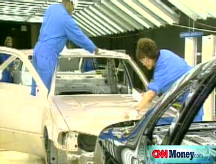Deadline looms for Detroit -- much at stake
GM and Chrysler have until Tuesday to prove to the government that they have a viable turnaround plan. The worsening outlook for auto sales makes that difficult.
NEW YORK (CNNMoney.com) -- On Tuesday, General Motors and Chrysler LLC have to submit plans to the government that show how they plan to turnaround their troubled companies. It won't be an easy task.
The two struggling automakers, which received approval for $17.4 billion in federal loans in December ($13.4 billion for GM and $4 billion for Chrysler), are required by the terms of their agreement to show that they can be viable for the long term. Otherwise, the government could recall the loans.
Both companies submitted turnaround plans to Congress in December when they were first seeking federal assistance -- but conditions have gotten considerably worse in just two months.
Auto sales in January were terrible, with the industry reporting a seasonally adjusted annual sales pace, or SAAR, of only 9.5 million cars and light trucks, the worst in 26 years.
And in a speech to the Economic Club of Chicago this week, Chrysler Vice Chairman Jim Press said that industrywide U.S. light vehicle sales could stay around 10 million annually for the next four years, a level at which no major automaker is able to make money.
"It would be a mistake to assume that this "10-million market" is an aberration. Instead, we need to accept and come to grips with it," Press said. "Yogi Berra was right when he said, 'The future just ain't what it used to be.'"
Unfortunately, another Berra quote also fits the current situation: "It gets late early out there."
Time and money could be running out for GM (GM, Fortune 500) and Chrysler. The worsening economic environment makes drafting the final plans that much more difficult.
Both companies need to win further concessions from creditors and the United Auto Workers union in order to really prove they can be viable.
GM is in talks with holders of $35 billion of unsecured debt to try to meet the government's goal of shedding two-thirds of that debt. GM is trying to get bondholders to accepting additional equity in the company in exchange for the debt.
Chrysler has little unsecured debt, which is the only type of debt the government is requiring to be cut. Still, Chrysler is also believed to be in talks with creditors about restructuring its debt.
On the cost-cutting front, both companies are offering buyouts to all their hourly workers. In addition, GM and Chrysler each won some concessions from the UAW, such as an end to the so-called "jobs bank" that guaranteed laid-off hourly workers nearly full pay during the life of the labor contract.
GM has also announced it is cutting about 10,000 salaried staff worldwide, and reducing the pay of the salaried workers who remain.
Both companies are negotiating with the union to try to win additional cost savings. Details of any agreements reached with the union and with creditors will be key parts of the plans that they submit Tuesday.
Still, a prolonged slump in auto sales may make it impossible for the two companies to return to profitability any time soon -- even with concessions from the union and creditors.
When the Bush administration approved stopgap loans for GM and Chrysler in late December, it was assumed this money would be enough to see the two automakers through their cash crunch and allow Congress and the incoming Obama administration to craft a longer term solution.
But the automakers could need additional cash sooner rather than later as long as sales remain depressed. GM said in its December plan to Congress that if industrywide sales stayed near the 10 million level through the first quarter, it would need about $15 billion in federal loans by the end of February.
GM said is has taken additional steps to cut costs since December, and spokesman Greg Martin said the current loan package should be able to get the company through the end of March.
But he wouldn't comment on whether the plan being submitted Tuesday would include a request for additional money. GM originally asked Congress for up to $18 billion to get it through all of 2009.
Chrysler is on record saying it still would like to receive the $7 billion it requested in December, which means it would need another $3 billion.
The other Big Three automaker, Ford Motor (F, Fortune 500), has said it believes it won't need access to federal loans. But it has asked for an $9 billion line of credit from the government in case conditions do not improve.
It has been widely assumed that it would be easier for the Big Three to get more help from this session of Congress, which has a bigger Democratic majority than last year. The nearly evenly-split Senate failed to pass the automakers loan request last year.
But more funding for Detroit may still be a tough sell.
Congress stripped out much of the tax breaks proposed to spur auto sales from the stimulus bill that passed the House and Senate Friday.
Also on Friday, House Speaker Nancy Pelosi, D-Calif., and House Financial Services Committee Chairman Barney Frank, D-Mass., sent a letter to the auto executives saying they must see proof Tuesday that the automakers have a feasible turnaround plan.
"We trust that your restructuring plan will demonstrate to the world that you are willing to make the tough decisions that modernize your operations, restructure your debt, enhance your competitive status in the global marketplace, and protect American jobs for the future," said the letter.
Still, questions remain as to how either company can truly be viable in this environment.
Chrysler, for example, is submitting a plan with two different scenarios: one which assumes a partnership with Italian automaker Fiat goes forward and one in which the deal has to be dropped.
As part of that partnership, announced last month, Fiat will provide Chrysler with "technology," including the engineering behind some of its small, fuel-efficient cars, in return for a 35% stake in the U.S. company.
But the deal is non-binding, and Fiat, facing its own financial struggles, is not providing Chrysler with any much-needed cash as part of the arrangement.
Chrysler also issued a statement Thursday saying that it is re-evaluating a proposed product tie-up with Nissan (NSANY). The companies said they need to "improve the financial objectives for both companies before the projects move further forward."
Nissan, along with other Japanese automakers such as Toyota Motor (TM), has also been hit hard during the global economic slump. It recently announced it would lose money this fiscal year and cut production.
And with the normally profitable Asian automakers struggling, this shows just how important it is for the cash-strapped GM and Chrysler to hang on to the loans they've already received. ![]()




